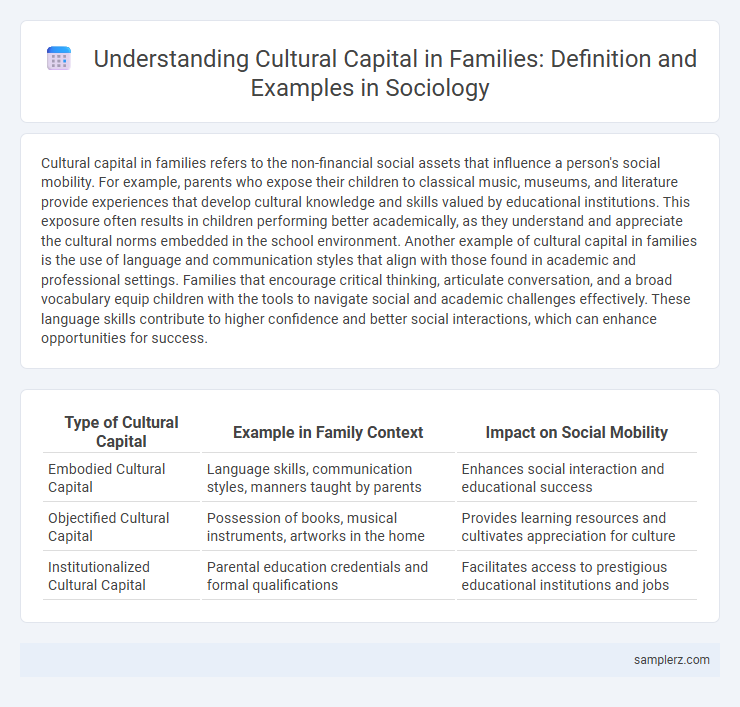Cultural capital in families refers to the non-financial social assets that influence a person's social mobility. For example, parents who expose their children to classical music, museums, and literature provide experiences that develop cultural knowledge and skills valued by educational institutions. This exposure often results in children performing better academically, as they understand and appreciate the cultural norms embedded in the school environment. Another example of cultural capital in families is the use of language and communication styles that align with those found in academic and professional settings. Families that encourage critical thinking, articulate conversation, and a broad vocabulary equip children with the tools to navigate social and academic challenges effectively. These language skills contribute to higher confidence and better social interactions, which can enhance opportunities for success.
Table of Comparison
| Type of Cultural Capital | Example in Family Context | Impact on Social Mobility |
|---|---|---|
| Embodied Cultural Capital | Language skills, communication styles, manners taught by parents | Enhances social interaction and educational success |
| Objectified Cultural Capital | Possession of books, musical instruments, artworks in the home | Provides learning resources and cultivates appreciation for culture |
| Institutionalized Cultural Capital | Parental education credentials and formal qualifications | Facilitates access to prestigious educational institutions and jobs |
Everyday Practices as Cultural Capital in Family Life
Everyday practices such as shared meals, storytelling, and participation in local traditions serve as integral forms of cultural capital within family life. These routines foster social cohesion, transmit values, and develop communication skills essential for social mobility. Engaging in culturally rich daily activities enhances children's cultural awareness and intellectual development, reinforcing their identity and social networks.
Transmission of Values and Beliefs Across Generations
Families transmit cultural capital by passing down values and beliefs that shape social behavior and identity across generations. Rituals, language, and storytelling serve as key methods for embedding ethical norms and collective memory within family units. This intergenerational transmission reinforces social cohesion and sustains cultural heritage within communities.
Language and Communication Styles in the Household
Language and communication styles in the household serve as key examples of cultural capital that shape a child's social development and educational success. Families that use rich vocabulary, complex sentence structures, and encourage open dialogue provide children with cognitive tools valued in academic and professional settings. Mastery of these communication styles enhances social mobility by aligning with dominant cultural norms and expectations.
Educational Support and Aspirations Within Families
Educational support within families manifests through resources like books, tutoring, and parental involvement in school activities, enhancing children's academic success and cultural competence. Families with high aspirations often encourage extracurricular engagement and higher education, reinforcing values that align with societal expectations of achievement. This investment in educational capital cultivates skills, knowledge, and attitudes that contribute to social mobility and long-term opportunities.
Family Traditions and Rituals Shaping Identity
Family traditions and rituals act as key examples of cultural capital by embedding shared values and collective memory within generations, strengthening social cohesion and identity. These practices, such as holiday celebrations, storytelling, and rites of passage, provide children with a sense of belonging and cultural awareness that transcends socioeconomic status. Through consistent participation in these rituals, families transmit cultural knowledge and social norms essential for navigating broader societal structures.
Parental Involvement in Children’s Social Activities
Parental involvement in children's social activities exemplifies cultural capital by fostering social skills, networks, and confidence essential for future success. By actively participating in school events, sports, or clubs, parents transmit values and knowledge that enhance children's social integration and academic achievement. This engagement creates opportunities for children to access social resources that contribute to upward social mobility.
Exposure to Arts and Literature at Home
Exposure to arts and literature at home enhances cultural capital by fostering early appreciation for creative expression and intellectual engagement. Families that regularly introduce children to books, music, theater, and visual arts contribute to the development of critical thinking skills and cultural awareness. This early immersion often leads to academic success and greater social mobility by building a foundation of cultural knowledge valued in educational and professional settings.
Social Etiquette and Manners Taught by Families
Families transmit cultural capital through social etiquette and manners, instilling values such as respectful communication, proper table settings, and punctuality. These learned behaviors enhance social interactions and can influence educational and professional opportunities. Mastery of family-taught social norms often leads to greater acceptance in diverse social environments and networks.
Networks and Social Connections Cultivated by Families
Families cultivate cultural capital through extensive social networks and connections that provide access to valuable resources, opportunities, and information. These networks often include relationships with teachers, community leaders, and other influential individuals that facilitate educational and professional advancement. The quality and breadth of these social connections significantly impact a family's ability to navigate social institutions and secure socioeconomic mobility.
Intergenerational Knowledge and Skill Sharing
Intergenerational knowledge and skill sharing in families exemplify cultural capital by transmitting valuable traditions, language, and crafts through generations. Parents and elders pass down specialized skills such as cooking, storytelling, and artisanal techniques, enriching children's cultural competence and identity. This process strengthens social cohesion and fosters an environment where inherited expertise enhances educational and social opportunities.

example of cultural capital in family Infographic
 samplerz.com
samplerz.com